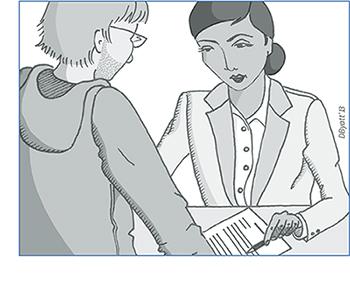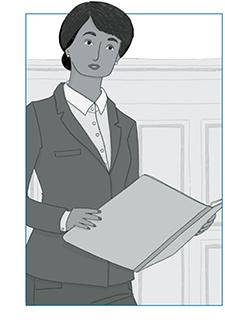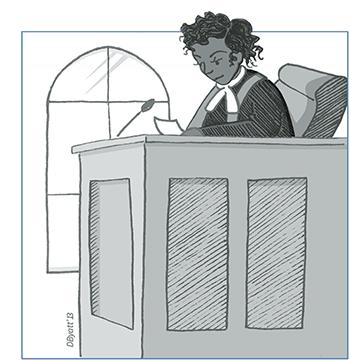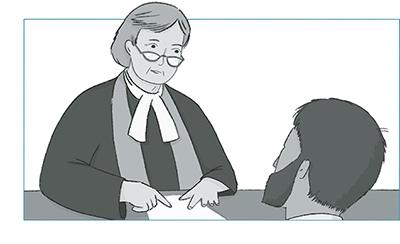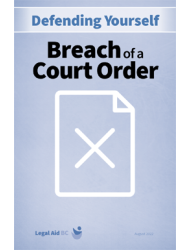Defending Yourself: Breach of a Court Order
On this page
This resource is for people who want to plead not guilty to a charge of breach of a court order. Use this resource if you don’t qualify for legal aid, you can’t afford a lawyer, and you plan to represent yourself (be your own lawyer) in court.
You should represent yourself only if you don’t qualify for legal aid and you can’t afford a lawyer. If you choose to do this, be sure to talk to a lawyer for advice before your trial. Some legal help is better than none. See “Where can I get legal help?”
This resource explains how to defend yourself when you’re charged with breach of a court order. It doesn’t try to cover every situation. For detailed information, speak to a lawyer about your case.
Are you Indigenous?
Indigenous peoples include First Nations, Métis, and Inuit. If you’re Indigenous and charged with a crime, the judge must apply Gladue principles when sentencing you. This means the judge must consider your personal and unique circumstances as an Indigenous person and options other than jail. Gladue principles apply to all Indigenous peoples. They also apply whether you live on or off reserve. See the BC First Nations Justice Council for more information.
Introduction
A breach of a court order is to disobey or to fail to comply with (fail to follow) a condition ordered by the court. The condition can be to do or not to do something as part of:
- a peace bond,
- a family law protection order (made in a family law case),
- a judicial interim release order (bail order),
- a summons, appearance notice, or undertaking to the police (court order or police requirement for you to appear in court at a specific time and place)
- a probation order (after you’ve been sentenced), or
- a conditional sentence order (generally means house arrest).
There are many types of conditions that can be ordered by the court, including:
- a no contact order (you mustn’t have direct or indirect contact with a particular person)
- a condition not to go to a specific area or place
- a condition not to be in possession of drugs or alcohol, or not to use them
- a condition to obey a curfew
- a ban from having weapons
You may be charged with a breach of a court order (a “breach”) if you fail to follow any court-ordered condition such as those above. Or you could be charged if, for example, you don’t do the following:
- Pay restitution.
- Attend counselling, when ordered by the court.
- Complete community service work hours that were ordered as part of a probation order or conditional sentence order.
- Keep the peace and be of good behaviour while on bail or on probation.
- Keep away from a person you were ordered not to have contact with.
- Stay away from a place you were ordered not to go to.
Depending on the details of the breach and your criminal record, the Crown prosecutor (also called the Crown) can choose to charge you with either a summary offence or indictable offence. You could get a jail sentence for either type of offence. Judges view a breach of a court order as a serious matter. They want to make sure court orders are respected and not ignored.
If the Crown proceeds “summarily,” the maximum sentence a judge could give you is two years less a day in jail, or up to a $5,000 fine, or both. Or you may have to serve the rest of your house arrest in jail if you’ve breached a conditional sentence order, or wait for your trial in jail if you’ve breached your bail. But the judge could give you a shorter sentence (and possibly no jail time), especially if you haven’t been convicted of a breach before.
If the Crown proceeds “by indictment,” the judge could give you a longer jail sentence of up to two years for a breach of bail, or four years for a breach of probation.
The first time you’re in court, ask the Crown if they’re proceeding “summarily” or “by indictment.” The Crown should also say whether they’re asking for a jail sentence. The Crown should also provide you with:
- particulars,
- details of the Crown’s case, and
- an Initial Sentencing Position, which tells you what the Crown would be seeking as a sentence if you were to plead guilty.
Do not plead guilty before speaking to a lawyer.
If the Crown says they’ll:
- proceed “by indictment,”
- ask for a sentence that includes jail, or
- ask for a sentence that will have other serious consequences for you,
immediately ask the judge to adjourn your case so you can get legal help.
If the Crown proceeds “by indictment” (or is asking for a jail sentence), you’ll usually have a better chance of getting legal aid — so be sure you understand how the Crown will proceed. Legal Aid BC may change its decision to not cover your case.
You can ask the court to appoint a government-funded lawyer to your case (a Rowbotham application) if:
- you can’t afford a lawyer and were denied legal aid, were denied legal aid and appealed your denial and were still denied;
- the Crown says that they’ll seek a jail sentence if you’re found guilty, or will seek any other type of sentence that will have serious consequences for you; and
- your case is too complicated for you to handle.
For more information on whether you’re eligible for a Rowbotham application, see If You Can’t Get Legal Aid for Your Criminal Trial.
Before the trial
When you prepare your defence, think about what evidence you can use. Evidence includes documents, witnesses, videos, recordings, or your own personal testimony. You don’t have to personally testify. You should ask a lawyer if it’s a good idea to testify. You have the right to not testify.
Make sure the Crown has given you all the evidence they’ll use (called the disclosure), such as security videotapes or witness statements before the trial date. The Crown should also tell you who they’ll call as a witness. You can send them a letter or email asking for this information. (See a sample letter in Representing Yourself in a Criminal Trial.)
Prepare to provide truthful and relevant evidence to the court. For more information about the trial process, such as how to use witnesses, prepare questions, and decide whether to testify yourself, see Representing Yourself in a Criminal Trial.
Remember: you have the right to not testify. Speak to a lawyer before you decide whether you should testify.
To defend yourself against a charge of breach of a court order, you may be able to use one (or more) of the following four points if they’re true:
If you weren’t aware of a condition or were confused by the explanation you were given about the meaning of it, the judge may find that you didn’t intend to breach the court order.
There might be situations outside of your control that prevented you from following the court order. For example, the judge may find that you had a good reason or a “reasonable excuse” for not completing the community service work hours on time if you were seriously ill during that period and couldn’t work. Or, perhaps you were asked to pay restitution as a condition of your probation and you lost your job and couldn’t pay. As well as giving a reasonable excuse, you’ll have to explain why you didn’t come to court and ask to change the condition or ask for more time.
For more information on whether your situation might be considered a good reason, get legal advice. To avoid problems, you can ask the court to change any condition that you believe is impossible to follow.
You may agree that you were fully aware of the court order and its validity, but you don’t agree that you breached the order.
If the police got evidence of the breach by violating your rights under the Charter of Rights and Freedoms, the judge might not let the Crown use that evidence. And if that happens, and there’s no other evidence proving your guilt, you can ask the judge to dismiss the charge against you.
Under the Charter, the police must do the following when they arrest you:
- tell you what they’ve arrested you for;
- tell you immediately that you can talk to a lawyer and let you do so in private before questioning you or taking any samples;
- give you access to a phone to speak to a lawyer privately; and
- tell you that you can get free legal help. (Legal Aid BC has lawyers available 24 hours a day to talk over the phone for free to people in police custody. This service is called the Brydges Line.)
Don’t make any statements to the police or anyone else before speaking to a lawyer.
If the police didn’t do all of these things (or others that the Charter requires, such as get a search warrant before searching your house or belongings), you can say that they violated your rights. You would then say that the Crown shouldn’t be able to use any statements you made or other evidence that the police got by violating your rights.
However, the judge won’t automatically throw out the evidence in question. You must also show that accepting the evidence will reflect badly on how justice is carried out in Canadian courts.
If you plan to argue that your Charter rights were violated, talk to a lawyer before your trial. Using the Charter is complicated and usually requires legal research. You must tell the Crown in advance if you plan to use this type of an argument.
If you’re accused of a breach of a probation order that is under appeal or you think is invalid, talk to a lawyer as soon as possible. The fact that you’re appealing your probation order is not a defence to a charge of breach of probation. Any probation order is in effect until:
- the appeal court cancels it, or
- you apply for a variation and the court changes it.
At the trial
At the trial, before you present your defence, the Crown will present the its case against you.
The Crown must prove beyond a reasonable doubt that you’re guilty of all the elements that make up the crime of breach of a court order. To do this, the Crown presents evidence to the court using witnesses, documents, videos, or recordings.
In the case of a breach of a conditional sentence (house arrest), the Crown needs only to present evidence to the court that shows that you more probably committed the breach than not (prove your guilt on a balance of probabilities). The Crown doesn’t have to prove beyond a reasonable doubt that you’re guilty of breaching the conditional sentence order.
If the Crown tries to use evidence that they didn’t tell you about in advance, you can object and ask the judge to dismiss the case or adjourn the trial.
You can cross-examine the Crown’s witnesses, but you’ll normally do so only if you disagree with their information. You can ask relevant questions about what the witness saw or knows. You can also ask leading questions, which means making a statement and asking a witness if they agree with it. For example, you could ask “Isn’t it true that you couldn’t really see what happened?” For more details about how to cross-examine, see Representing Yourself in a Criminal Trial.
For a judge to find you guilty of breach of a court order, the Crown must prove the following things:
The Crown must prove that the court order was made. To do this, the Crown will have the court declare that it has the records to support this. Or, if the order was made in another court, the Crown will produce documents (such as a signed Release Order) to prove that the order exists.
If the order was made in another court, the Crown must give you advance notice that they’re going to file documents to prove that the order exists. If they don’t give you advance notice, you can object.
The Crown must prove that the court order was for you and that you were aware of it and acknowledged it (either verbally in court or by signing a copy of it upon your release). The Crown may do this by calling witnesses who reviewed the order with you (such as a court clerk, probation officer, or bail supervisor) and/or by producing documents (such as a signed Release Order).
The Crown must then prove that you’re the person who committed the breach. To do this, the Crown will call witnesses, including police officers, to give evidence. The witnesses will probably describe the person they saw or heard committing the breach. Then the Crown will ask the witnesses to say if that person is in the courtroom.
The evidence, either from the witnesses or from other sources (such as fingerprints, a photograph, a video, or audio recording), must show that you committed the breach.
The Crown must prove:
- that the breach happened in BC,
- the date of the breach, and
- the specific location where it happened.
These details are included on the Information. This is the official court form (listing the date, place, and type of offence) that the Crown will give you before the trial as part of your particulars. The Crown must still prove these details at the trial. The Information for a summary offence has to be sworn within one year of the offence.
The Crown will usually call a witness to give evidence about the date and place of the crime. This witness may be a police officer or another person.
A breach of a court order may be prosecuted (brought to trial) either where the court order was made or in the specific location where the breach took place if it happened in Canada.
The Crown must prove that the conditions in the court order were explained to you and that you were given a copy of the order. The Crown will ask the person who reviewed the order with you what they told you and if you had any questions. If you needed an interpreter, the Crown will call the interpreter who reviewed the order with you. The Crown may also use documents that you’ve signed to prove that you understood the conditions in the order.
The Crown must prove that your action (what you did) or omission (what you didn’t do) amounts to a failure to comply to (follow) a condition of the court order.
For example, to prove this, the Crown might call as a witness any of the following people to give information:
- your probation officer to say that you haven’t completed the number of community service hours within the time limit,
- your bail supervisor to say that you failed to report as required,
- the police officer who arrested you after the curfew hours, or
- the people whom you weren’t allowed to contact to say that you did (by phone, email, etc.). Remember: even if the person who you are ordered not to have contact with contacted you, you will still be in breach if you talk or communicate with them.
Don’t plead guilty to the charge of breach without talking to a lawyer.
Sometimes the Crown uses an affidavit to prove some of the points in its case. If the Crown plans to use an affidavit, they should give you a copy of this document before the trial. If you disagree with it, or if you think it should include other information, ask the Crown and the court to make the person who swore the affidavit come to your trial. Then you can question that person about the information that they swear is true.
After the Crown finishes presenting its case, it’s your turn.
You now have your chance to use the points you’ve prepared as your defence. You can use your gathered evidence, call witnesses, and, if you want to, give evidence as a witness yourself. You have the right to not testify. Ask a lawyer whether you should or not. See Representing Yourself in a Criminal Trial for more details.
After you finish presenting your defence, you close your case. Tell the judge why you think the Crown didn’t prove that you’re guilty beyond a reasonable doubt, or didn’t prove your guilt on a balance of probabilities (in the case of a hearing on a breach of a conditional sentence order).
Mention if you think the Crown’s case was weak or inconsistent in any area. This summary is called your submission. See Representing Yourself in a Criminal Trial for more details.
Once you and the Crown have finished speaking, the judge will decide if you’re guilty or not. If the judge finds you guilty, you’ll receive a sentence. The sentence depends on the details of the offence and your criminal record. It could be any of the following:
- an absolute discharge (your record won’t show a conviction)
- a conditional discharge (you’ll be regarded as not having been convicted if you meet conditions that the judge sets)
- probation (a “suspended sentence” including various conditions, for example, community service)
- a restitution order (you must pay money to the victim)
- a fine (up to $5,000)
- a conditional sentence (most often means house arrest for jail sentences of less than two years, which is like a jail term, but you serve it in the community)
- a jail term (up to two years less a day for a summary offence, or for an indictable offence up to two years for breach of bail or up to four years for breach of probation)
- cancellation of house arrest if you were on a conditional sentence order (you have to serve the rest of it or some of it in jail)
(Note that a judge usually only grants a discharge when an accused person has pleaded guilty and doesn’t have a previous criminal record.)
You get a chance to speak to the judge before they decide your sentence. (This is called speaking to sentence.) The judge will give you a chance to explain why you committed the crime, why you won’t do it again, and whether you need help for any problems you may have that were connected to the crime. Speaking to sentence is important because it gives you a chance to explain your situation to the judge. You can ask for a lower sentence than what the Crown is asking for.
Read Speaking to the Judge Before You’re Sentenced before you go to court.
The maximum fine for most summary offences is $5,000. If the judge fines you, you can ask for time to pay. Tell the judge how much you can pay each month. If you think you will run out of the time set for paying your fine, you must come back to court and get an extension. Do this as soon as possible.
You’ll usually also have to pay a victim surcharge, which is 30 percent of your fine, or $100 for a summary offence, or $200 for an indictable offence. The judge can reduce the amount or drop the surcharge completely if you show that paying it would cause you undue hardship. For example, this could be because you:
- are unemployed,
- are homeless,
- don’t have assets, or
- have significant expenses for your dependant(s).
Being in jail isn’t an undue hardship.
Even if you can’t afford a lawyer to represent you in court, it’s a good idea to talk to one before your trial or before you decide to plead guilty.
Criminal Duty Counsel
Speak to duty counsel at the courthouse where you’re charged. Duty counsel are lawyers who give free legal advice. When they’re available, they can give you brief, summary advice about the charges against you, court procedures, and your legal rights. Duty counsel can also speak on your behalf the first time you appear in court, but they can’t act as your permanent lawyer or help you at your trial.
Legal Aid BC
Call Legal Aid BC at 604-408-2172 (Greater Vancouver) or 1-866-577-2525 (elsewhere in BC) or your local courthouse to find out when duty counsel will be there. See the Provincial Court of BC website for links to courthouse locations.
Lawyer Referral Service
If you don’t know a lawyer who handles criminal cases, contact the Lawyer Referral Service to get the name of a local lawyer to talk to for 15 minutes for free. You can find out what they’d charge if you need more help and decide whether you want to hire them. Call the service at 604-687-3221.
Access Pro Bono
Access Pro Bono runs free legal advice clinics throughout the province. To make an appointment, call 604-878-7400 or 1-877-762-6664.
University of British Columbia’s Indigenous Community Legal Clinic
The University of British Columbia’s Indigenous Community Legal Clinic in Vancouver’s Downtown Eastside provides free legal advice, accompaniment to court, and advocacy to Indigenous people who don’t qualify for legal aid. Call 604-822-5421 (Greater Vancouver) for more information.
BC First Nations Justice Council
The BC First Nations Justice Council operates justice centres and provides Gladue services. Call 1-877-602-4858 for more information.
Indigenous Justice Centres
Indigenous Justice Centres, run by the BC First Nations Justice Council, offer culturally appropriate advice and representation services across BC.
Eligible callers can also get help through the Virtual Indigenous Justice Centre (VJIC). Call 1-866-786-0081 for more information about the VIJC.
Native Courtworker and Counselling Association of BC
You can get support from a Native courtworker. The Native Courtworker and Counselling Association of BC helps Indigenous people involved in the criminal justice system. Call 604-985-5355 (Greater Vancouver) or 1-877-811-1190 (elsewhere in BC) for more information.
Law Students’ Legal Advice Program (LSLAP): University of British Columbia
You can get free legal advice or help if you’re charged with a summary offence and the Crown isn’t asking for a jail sentence if you’re found guilty. To find the nearest LSLAP clinic location, call 604-822-5791 or visit the LSLAP website.
The Law Centre: University of Victoria
If you live in Victoria, The Law Centre may be able to help you. Call 250-385-1221 for more information.
Community Legal Clinic: Thompson Rivers University
If you live in Kamloops, Thompson Rivers University’s Community Legal Clinic can provide you with free legal help and advice. Call 778-471-8490 for more information.
Contact a lawyer in private practice
Find out if the lawyer is willing to help and what it will cost. Even if you pay for just one or two meetings to get basic advice about your particular case, it could be worth the cost.
Get help from a legal advocate
Find a legal advocate at a local organization on the Clicklaw HelpMap.
Visit the Clicklaw website
For more information about the law, visit Clicklaw. The website has links to legal information, education, and help. You can find out about your rights and options, get toll-free numbers for law-related help, and learn about the law and the legal system.

